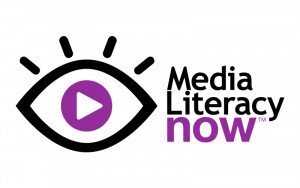A new survey finds that most people did not learn to reflect on media messages in school, and few learned to use media literacy skills when considering science news.
Media Literacy Now partnered with the Reboot Foundation to include questions regarding exposure to media literacy education in an annual national survey. This year’s survey topic focused on the state of science literacy and its impact on our social and political lives. The survey found only 42% of respondents reported learning to analyze science news in high school. All students need the ability to access, analyze, and evaluate science-related news, particularly when climate and pandemic issues are at the forefront of today’s news reporting.
Only 38% of respondents reported learning how to analyze media messaging, such as in advertising or on TV programs, and how those messages might affect people’s thoughts, beliefs, feelings, or actions.
Reboot Foundation’s report found that the survey’s questions on science literacy and critical thinking suggest that deficits in education, both science literacy and media literacy, are associated with belief in discredited conspiracy theories. Survey respondents who reported that they were taught in high school to analyze science news stories are less inclined to believe in discredited conspiracy theories. Education in media literacy in general seemed to give participants the skills and background to better think critically about such circulating theories.
“It’s clear from this survey that Americans are lacking key life skills they need to navigate an increasingly complex media environment,” said Erin McNeill, founder and president of Media Literacy Now. “Policy makers must take note and prioritize media literacy education for all students. It’s not just about solving political polarization. People need to understand media systems and have an opportunity to develop skills to analyze messages and think critically about the source and who benefits from messages shared so they can make decisions for themselves and their families, without undue influence and manipulation.”
In fact, an overwhelming majority of survey respondents – 84% – said they supported required media literacy education in schools, and 90% said they supported required critical thinking instruction at the K-12 level. However, media literacy remains under-taught in schools, though there have been recent strides to add it to curriculum.
“The Reboot Foundation believes that in order for leaders to chart a path forward, the process must begin with an education that prepares students for the modern media environment and equips them with the skills to understand and evaluate complex concepts in science and technology,” said Helen Lee Bouygues, president of Reboot. “While it is heartening to see some steps taken in this direction in recent years, more new programming, legislation, and curriculum changes at the local level are needed to address this problem.”
Explore the survey’s media literacy findings.
For overall findings, research method, and detailed findings and discussion, you can download the full report, “Science Fictions: Low Science Knowledge, Poor Critical Thinking Linked to Conspiracy Beliefs” from The Reboot Foundation’s website.

